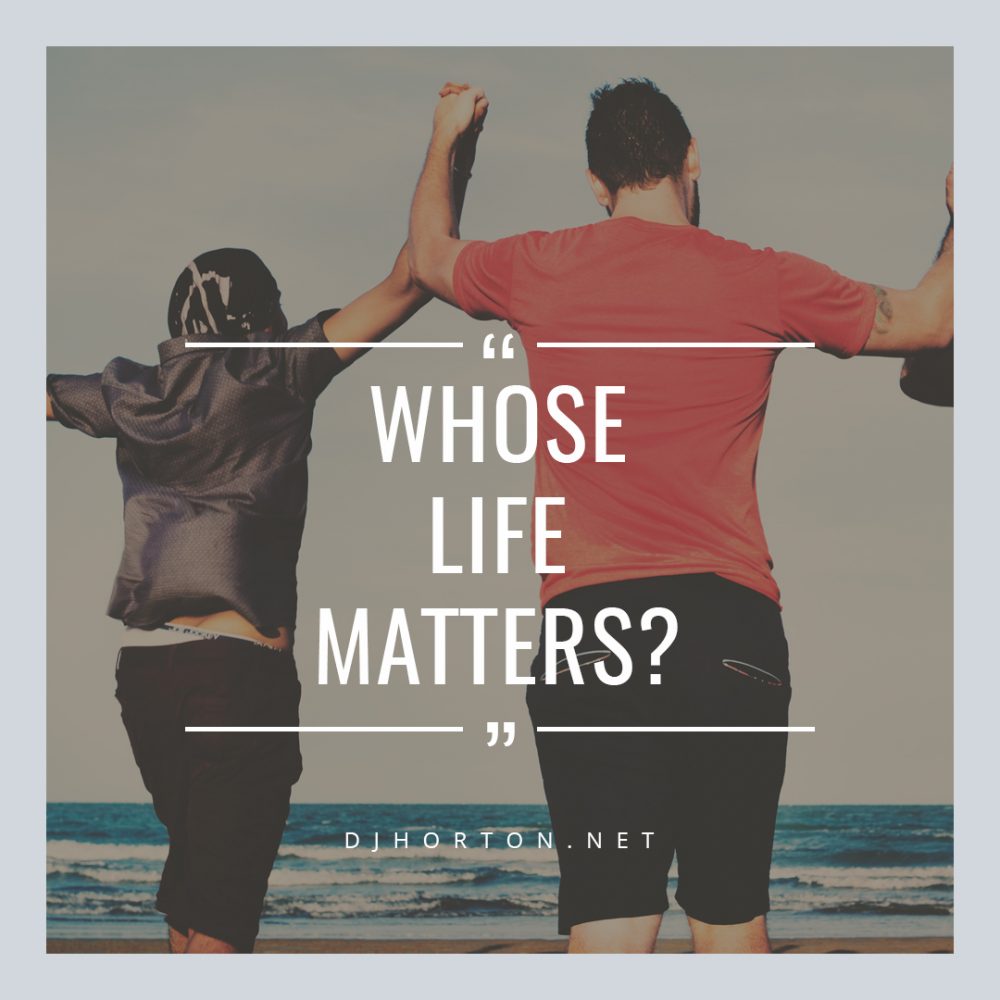Virtually everyone reading this has an opinion about the current public debate concerning the relationship between citizens and those in law enforcement. Those in the Black Lives Matter movement feel strongly that African Americans have been the unjust recipients of police brutality and lethal force for too long. The recent murderous attacks upon police officers have spurred on the Blue Lives Matter movement defending the overwhelming majority of civil servants who do their job justly and sincerely. Then of course, there is the call by many that, in fact, all lives matter. As a Christ follower and pastor, I find myself always trying to do the hard work of pouring recent events through the filter of God’s Word and I want to take my cues from Christ Himself on matters of such significance.

Remarkably, Jesus spoke directly to this subject with amazing clarity when He was asked just who our neighbors are. A lawyer asked Jesus for a ruling concerning the great commandment of loving God and loving one’s neighbor. Of course the Jewish man knew who God was, but determining the identity of his neighbors seemed to be the challenge. Today we find ourselves still wrestling with this challenge. At the heart of this latest social struggle is the treatment of those unfamiliar to us; whether it is a man in uniform or a young black male during a traffic stop. It could also be the gay couple next door or the conservative Christian we work beside. If America is the great melting pot of diversity, it seems as though we are not melting together very well. The dark side of my heart has a simple way to identify my true neighbors. If you know me, love me, treat me kindly, share my values, or show me respect, then you are my neighbor; plain and simple. It is those people that I most want to be with and treat well. All others need not apply for the title of being my neighbor because if you do not treat me neighborly you should be ready for my rejection, condemnation, or most commonly, my quiet disapproval. This is how we are functioning as a society and the justifications are many.
Jesus, however, has a different message. He shatters our thinking with a story he told the lawyer who posed the question. It’s most widely known as the story of the Good Samaritan and it is found in the gospel of Luke 10:25-37. To summarize, a man is robbed, beaten, and left for dead on a stretch of road that was anything but pleasant. A priest (Jewish, not Catholic) came by, but instead of helping, passed by on the other side of the road. A Levite (a man from the Isrealite tribe assigned with the care of the temple and all the worship and sacrifices that entailed) also passed by and did the same as the priest. Then a Samaritan came by and had compassion on the victim. He bandaged him, took him to an inn, and even paid for his care.
One must understand that this is a story with multiple layers.
It is a story about race.
The Jews and Samaritans during Jesus’ day had a long standing hate for one another due to a conflict centuries before when the Israelites were conquering the land they so cherished.
It is a story about religion.
The Priest and Levite would have violated ceremonial laws of cleanliness had they touched the bleeding man’s filthy body. Likewise, everyone listening to the story would have solely rejected the Samaritan’s religious practices and place of worship.
It is a story about crime and the victims of crime.
The man beaten was the victim. The Priest and Levite decided it was not a situation that concerned them. The Samaritan’s life was interrupted by the injustice and it cost him time, money, and even risked his own safety.
At the bottom of all these layers, Jesus used this story of race, religion, and crime to show that ultimately this is a story about you.
That is right. You read correctly. This is a story about you. Remember Jesus was supposed to be answering the question concerning the identity of our neighbors (you know…the ones God says we are supposed to love). Jesus, however, ends by asking a question of his own. He looked at the lawyer and asked, “Which of these three, do you think, proved to be a neighbor to the man who fell among the robbers?” The lawyer answered, “The one who showed him mercy.” And Jesus said to him, “You go, and do likewise” (Luke 10:36-37 ESV). Did you catch that? Do you see what Jesus did? He showed that the wrong question had been asked. God does not want us to define who our neighbors are and then treat them accordingly. Rather, He desires that we concentrate more on BEING a neighbor to whoever is in front of us! If a police officer is in front of me then his life matters. If a black man is in front of me then his life matters. If a gay person, a Muslim, a refugee, a born again Christian, a child with special needs, or one of my children is in front me then, in that moment, his or her life should matter to me. Do we ignore our beliefs, our respect for the law, or even the appreciation of our own culture? Of course we do not. However, the heart of God is that we are kind and compassionate to whomever crosses our path, even if he is lying on the road in front of us bleeding, filthy, from another race, with another religion.
The life that matters is the one in front of you, whoever that may be. So coin a new phrase with me with the next person you see. Say this either out loud or silently as you begin your interaction; YOUR life matters.

